
The Griffin Cancer Research Building accelerates the quest to end cancer.


The Griffin Cancer Research Building accelerates the quest to end cancer.
The transformational impact of philanthropy has been evident across the University of Miami this spring.
In March, Sylvester Comprehensive Cancer Center, the only NCI-designated cancer center in South Florida, celebrated a landmark $50 million gift from Kenneth C. Griffin. This donation will help fund the Griffin Cancer Research Building— catalyzing Sylvester’s growth and accelerating life-saving research.
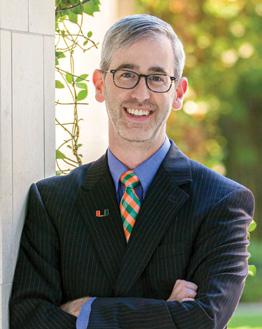
On the Coral Gables campus, the new theatre arts building is taking shape, and the Newman Recital Hall in the Knight Center for Music Innovation hosted its inaugural performance season. All are made possible by the generous support of our visionary donors, as are countless other programs and initiatives that transform lives for the better, from new scholarships and life-changing experiential learning opportunities to extraordinary medical, scientific, and scholarly breakthroughs.
Now, as we continue the countdown to the University’s centennial next April, we will, with your steadfast support, build on these successes and reach for even higher levels of achievement and excellence. On behalf of a grateful U, thank you.

Joshua M. Friedman, CFRE
Senior
Vice President
for Development and Alumni
Relations
Chief Executive Officer and Acting President
Joseph J. Echevarria
Senior Vice President for Development and Alumni Relations
Joshua M. Friedman
Managing Associate Vice President, Strategic Initiatives and Strategic
Philanthropy
Claudia Grillo
Executive Director, Development Communications
Tamara Klingler
Senior Director, Development Communications
Maria Aizcorbe
Julie Levin
Director, Development Communications
Pamela Edward
Priyanka Sinha
Senior Art Director
Sau Ping Choi
Editor
Pamela Edward
Contributors
Jenny Abreu
Stacey Bomser
Steve Boxall
Christy Cabrera Chirinos
CLUTCH Content Partners
Benjamin Estrada
Robert C. Jones, Jr.
Tamara Klingler
Jeanne Krull
Maeve McQueeny Miami in Focus
Dan Perez
Joshua Prezant
Sonya Revell
Matt Rice
Robin Shear
Smash Pixel Studio
Andi Speedy
University Libraries
Illuminate is published by the University of Miami Division of Development and Alumni Relations, 6200 San Amaro Drive, Suite 300, Coral Gables, FL 33146, devcomm@miami.edu. Reproduction in whole or in part without written permission is prohibited. Comments and opinions expressed in this magazine do not necessarily reflect those of the University of Miami or Illuminate staff.
©2024 University of Miami, an Equal Opportunity/Affirmative Action employer. All rights reserved.
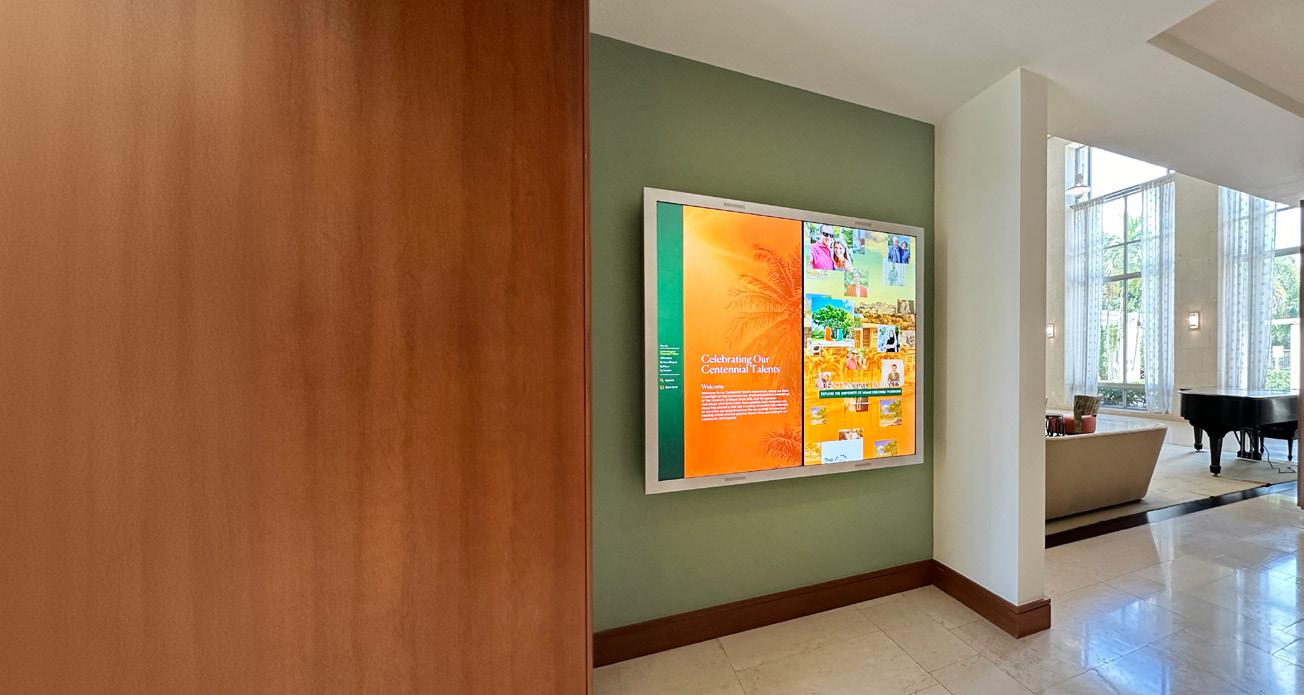
The expansion of the Cuban Heritage Collection oral history archives will help preserve stories from generations past and those yet to be told.
His family fled Cuba when he was six. His father never looked back, while his mother worked hard to preserve the family’s Cuban heritage and culture.
So explained Roberto S. Goizueta, professor emeritus of theology at Boston College and director of The Goizueta Foundation, during a live oral history session and reception this spring at the Roberto C. Goizueta Pavilion at the Otto G. Richter Library marking the expansion of the University of Miami Cuban Heritage Collection’s (CHC) oral history archives.
In a conversation moderated by Ana VeigaMilton, B.S.E.E. ’87, J.D. ’93, University trustee and member of the Libraries’ Dean’s Advisory Committee, Goizueta recounted heartfelt stories about his family’s journey as part of the Cuban and Cuban American experience.
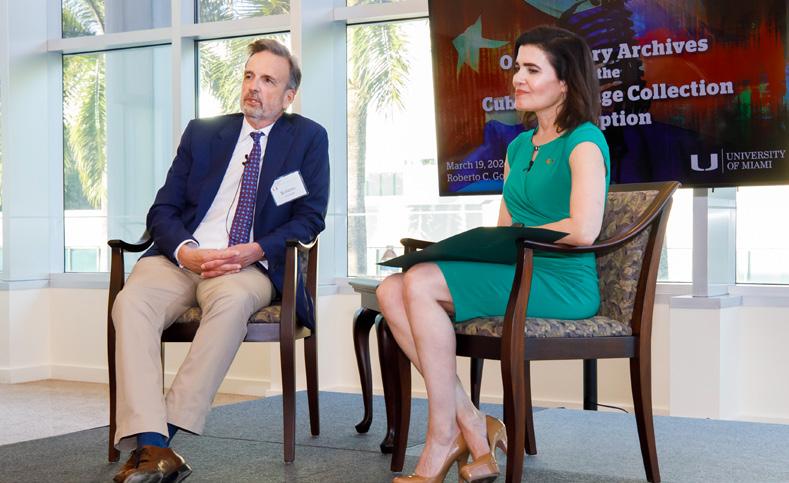
Goizueta’s father, Roberto Críspulo Goizueta, described by his son as a man who believed there were no obstacles, only opportunities, rose through the ranks at Coca-Cola, ultimately becoming chairman and CEO—positions he held for 16 years until his death in 1997. His mother, Olga Goizueta, held several leadership positions with Atlanta-based community organizations and was trustee and chair of The Goizueta Foundation.
Goizueta’s recollections underscored the determination of Cuban Americans to uphold their heritage despite geographical and cultural barriers while simultaneously feeling deep gratitude to the country that took them in.
That spirit is at the heart of the University’s commitment to preserving Cuba’s cultural heritage, explained Charles Eckman, dean and University librarian. Eckman highlighted the University’s collaboration with Cuban librarians and the exile community in building the collection, the largest repository of Cuban history outside the island.
Since 2008, the CHC has diligently documented the rich tapestry of South Florida’s exile community by recording
oral histories. While the project’s scope has been primarily focused on prominent Cuban Americans, the oral history event aimed to ignite enthusiasm and support for the CHC’s plan to broaden its collection to include histories of individuals from all walks of life.
As VeigaMilton remarked, “we hope to highlight the importance of recording our diverse personal, familial, and shared stories as a community before it is too late.”
The Goizueta Foundation has supported the CHC with grants and bequests that facilitated the construction of the Roberto C. Goizueta Pavilion and established endowments for various initiatives, including graduate student fellowships, acquisitions, research, and leadership positions, ensuring the continuation of the CHC’s work.
Amanda Moreno, B.A. ’12, Esperanza Bravo de Varona Chair and director of the CHC, highlights the significance of preserving the diaspora’s legacy, emphasizing the need to capture the stories of various generations and backgrounds: “The preservation of our heritage hinges on our ability to document diverse experiences. We’re committed to acquiring diverse collections to meet the needs of students, scholars, and the local community, ensuring accessibility to all.”
Alumna Jayne Baron Sherman, an award-winning producer, is helping future generations of theatre arts students at the University tell compelling stories.
As a student at the University of Miami in the 1960s, Jayne Baron Sherman, B.A. ’67, loved film and theatre. Her first career, however, was in the marketing and public relations sphere.
“There came a time when I felt I needed something else,” Sherman recalls. Friends encouraged her to pivot to film and theatrical production.
“There was part of me that was an artist and part of me that was a businessperson, and I discovered that producing [allowed me] to put the two of them together instead of them battling each other,” she says.
The result has been a hugely successful second career. Sherman’s Broadway hits include Tony Award-winning productions of “Kinky Boots,” “Hedwig and the Angry Inch,” and “The Normal Heart.” In addition to her extensive theatrical work, she has produced films and television shows, several of which are streaming on Amazon Prime Video, Netflix, Apple TV+, and Hulu.
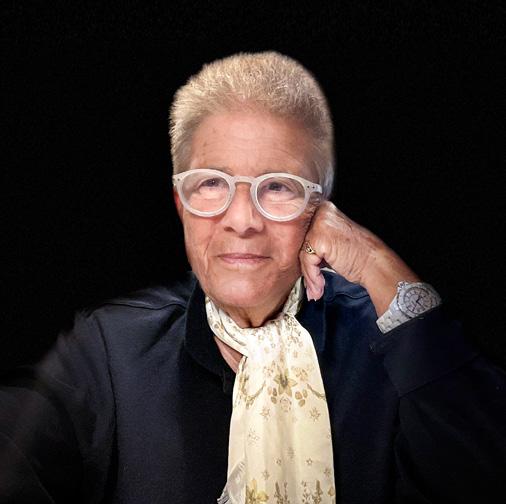
For Sherman, the essence of a producer’s job is, as she put it, the love of the work—and a good head for business. Sherman gains the greatest satisfaction in seeing her and her colleagues’ efforts come to life on stage or film. She wants future generations of theatre students at the University to experience this feeling.
“I think the University of Miami is a wonderful school, and the theatre arts are well recognized,” Sherman says. When she heard about the new theatre arts building—and what it would mean for students and faculty—she was inspired to make her gift.
Thanks to a generous gift from Sherman’s late father, their family name graces the Alvin Sherman Family Stage in the Jerry Herman Theatre, and she is now looking to cement her theatrical legacy at the University. She has made a $3 million gift to the Department of Theatre Arts to support productions, programming, and technology maintenance and upgrades for the Jerry Herman Theatre and the black box theatre in the new theatre arts building, which is currently under construction.
“Our theatre arts program gives students who seek professional careers in the theatre
“Theatre and film help change lives in the simplest way… good theatre and film are always more universal than the actual story.”
— Jayne Baron Sherman
the foundational training and exposure they need to succeed,” says Leonidas Bachas, dean of the College of Arts and Sciences. “Jayne’s generous gift will strengthen the program and help ensure the continuation of high-quality, leading-edge productions for years to come.”
Sherman is particularly interested in the black box theatre in the new building. As she explained it, a black box theatre is a space where directors, performers, and crew can workshop new pieces. “It fosters smaller dramatic productions and more experimental work,” she says. “The new black box theatre will give students the opportunity to do more in terms of theatre arts.”
In addition to her generosity to theatre arts, Sherman is a steadfast supporter of the University’s LGBTQ+ Student Center. Last year, she and her wife established an endowed fund that provides stipends to students with financial need who are involved in, or have an affinity for, the LGBTQ+ community.
Sherman sees her work, which regularly includes characters and themes related to a range of social justice issues, as an opportunity to influence people’s perceptions. “Theatre and film help change lives and minds in the very simplest way—we hear this all the time,” she says. “Good theatre and good film are always more universal than the actual story.”
A new eye prosthetic provided by Bascom Palmer Eye Institute gives a girl life-changing confidence and self-esteem.
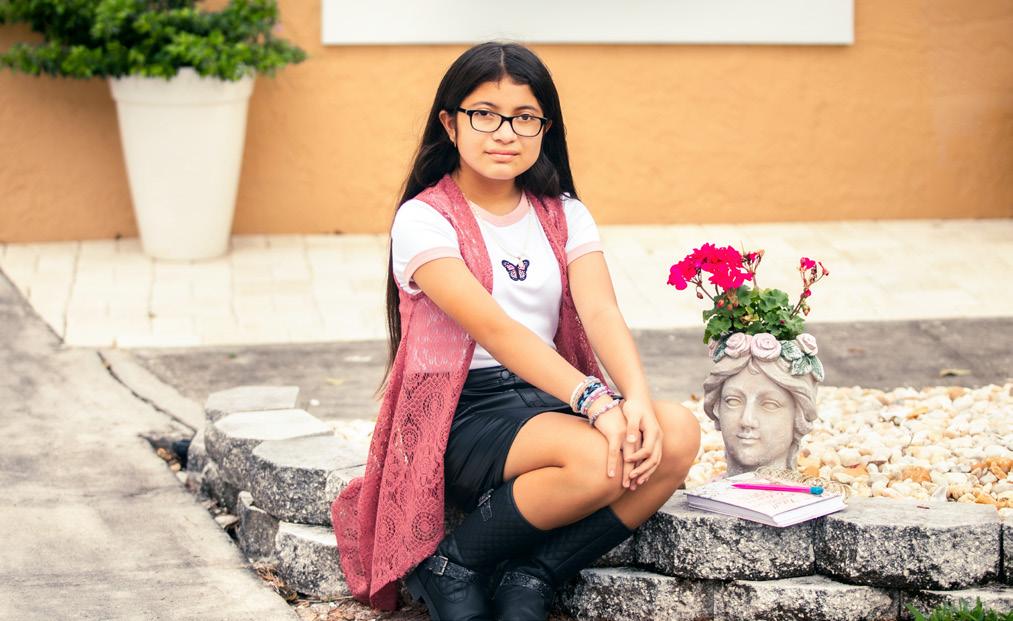
Sandra Arevello sees herself in a whole new light these days.
Born with a small eye socket, or microphthalmia, the 11-yearold Naples, Florida, girl wears an eye prosthesis that needs to be replaced as she grows to ensure her orbital bones develop properly and do not cause facial deformities. Sandra received her last prosthesis when she was 7 and was long overdue for a replacement.
Self-conscious about how she looked with her ill-fitting prosthesis, Sandra had stopped socializing until Bascom Palmer Eye Institute, supported by a grant from the Naples Children & Education Foundation, provided her with a new one. “This has helped my self-esteem greatly,” she says. “I’m more confident and feel pretty, as well.”
Sandra’s mother credits Bascom Palmer and NCEF for restoring her daughter’s health and well-being. “There are not enough words to explain how grateful we are,” Sandra Lemus Peña says. “Without them, I would not have been able to get Sandra the help she desperately needed.”
Sandra’s case illustrates the impact NCEF’s Vision Initiative has had on underprivileged, at-risk children in Collier County, Florida, since it was established in 2012.
“When Bascom Palmer joined as a partner in 2020, we were able to expand our services to treat children with most acute eye care challenges,” explains Maria Jimenez-Lara, chief executive officer of NCEF. “This is in addition to the approximately 20,000 on-site vision screenings we provide each year to students in Title I schools, providing comprehensive eye exams and two pairs of glasses—one for home and one for school—when medically appropriate.”
Sandra’s optometrist at Bascom Palmer in Naples, Dr. Bailey Peterson, says these services are life-changing for children. “A lot of these families do not have insurance or access to vision care,” Dr. Peterson says. “But because of this vital partnership with NCEF, we can provide children with care so that they have the best prognosis and an equal chance to succeed in life.”
A daughter’s devotion to her beloved mother is the motivation behind Lois Pope’s generosity to the Bascom Palmer Eye Institute and their efforts to transplant a human eye.
Palm Beach philanthropist Lois Pope has never forgotten those who fought to save her mother’s sight. Her steadfast support of the Bascom Palmer Eye Institute at the University of Miami Miller School of Medicine is motivated by the memory of her mother’s struggles with macular degeneration.
“My mother suffered for many years from the terrible, life-altering impact of macular degeneration. Because of her condition, I set out to learn as much as I could about such diseases,” remembers Mrs. Pope.“While I learned that there are treatments to slow the progression of macular degeneration, there are no cures yet. That was the impetus for creating the Center, but that was only the first step.”
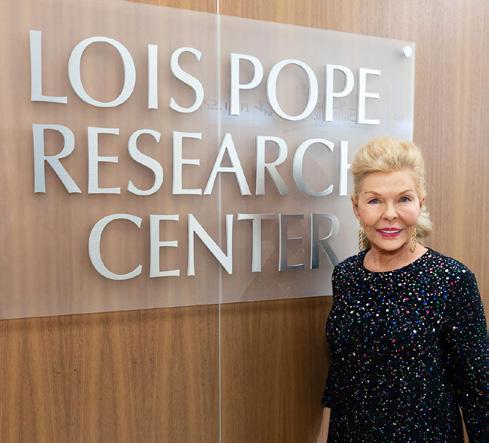
restore vision to millions of people affected by uncorrectable vision loss or blindness.
Mrs. Pope’s $12 million gift in 2018 created the Lois Pope Center for Retinal and Macular Degeneration Research on Bascom Palmer’s Palm Beach Gardens campus. Previously, she generously advanced the neurosciences by establishing the Lois Pope LIFE Center, the world’s foremost center for research, treatment, and services for paralysis and other neurological disorders.
Mrs. Pope hopes her latest gift of $1 million will one day lead to the transplantation of an entire, functional human eye, a quest that has been called the scientific Everest. If successful, the procedure could
Through her relationship with Dr. Eduardo C. Alfonso, director of Bascom Palmer, professor and chair of the Department of Ophthalmology at the Miller School, and the Kathleen and Stanley J. Glaser Endowed Professor in Ophthalmology, Mrs. Pope learned of the effort to mobilize scientific forces to transplant a human eye and wanted to be part of the quest.
“I’ve had a long and cherished friendship with Dr. Alfonso, and he’s always been my go-to person for everything eyerelated,” explains Mrs. Pope.“During one of our conversations, he told me about the work the Institute was beginning to do on the development of a so-called bionic eye. He told me that with new technology and
advances, most notably involving the promise of stem cells, that a whole-eye transplant was maybe only 10 years away. Well, to be a small part in making history was an opportunity I could not pass up, and especially given my mother’s history.”
The eye is one of only four organs yet to be transplanted. A primary challenge has been figuring out how to regenerate the optic nerve. Once that hurdle is overcome, the resulting nerve regeneration could help patients with spinal cord injuries, Parkinson’s disease, Alzheimer’s disease, and potentially many others.
“The relationship between Mrs. Pope and Bascom Palmer has been enduring and longlasting,” says Dr. Alfonso.“Her commitment to this project is a key endorsement, and her support will be truly transformational in moving this initiative forward. For Mrs. Pope, her support of a project has always been about how it can help the largest number of people and not herself. She is completely selfless in that regard, and it makes her extraordinary in the world of philanthropy.”
For her part, Mrs. Pope is very clear on what inspires her philanthropy.
“I do my homework and find out as much as I can,” she says.“I want to know that [I] can make a discernible difference, to truly make an impact in people’s lives.”
Athletics Director Dan Radakovich, M.B.A. ’82, Deputy Director of Athletics
Rachelle Paul, honoree Jaida Patrick, and new Women’s Basketball Coach Tricia Cullop
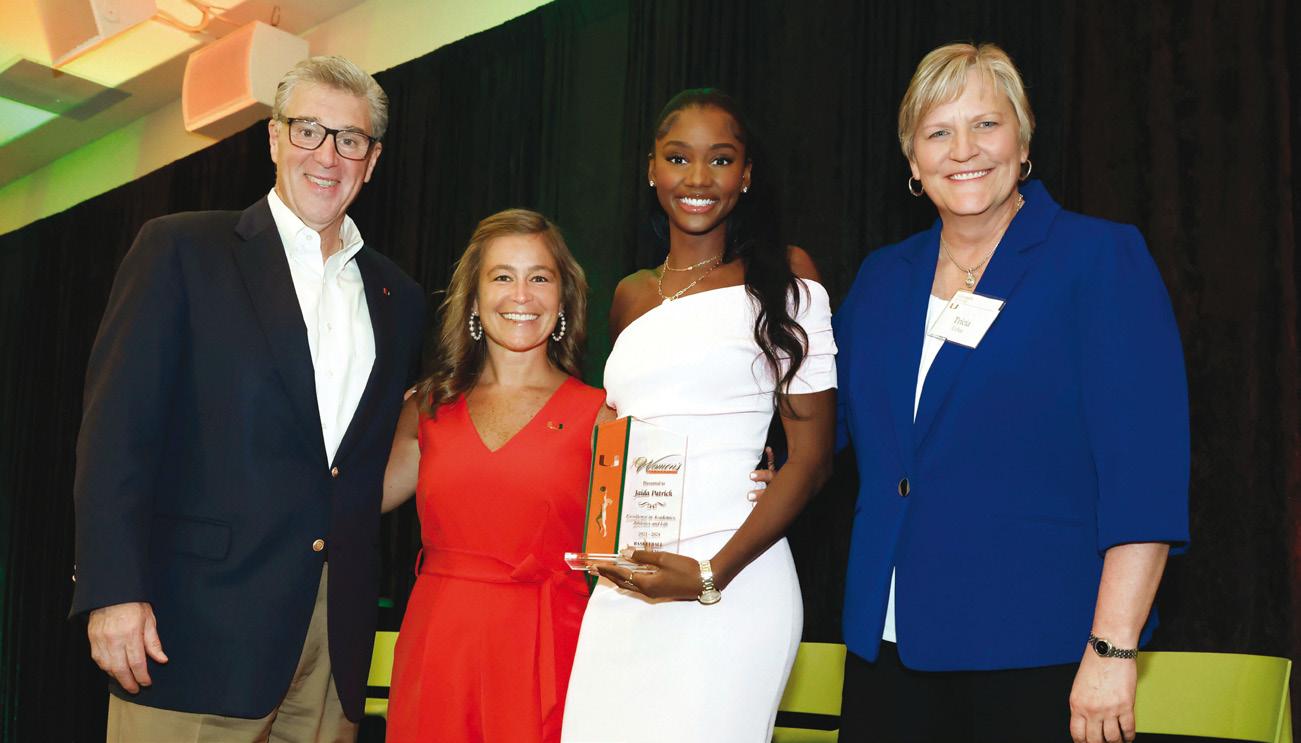
The Celebration of Women’s Athletics marked its 10th anniversary with a stellar lineup of accomplished student-athletes—and those whose unfailing support makes their achievements possible.
She is a national champion, a University of Miami alumna with a pair of master’s degrees, and one of the most decorated track and field athletes ever to don orange and green.
Michelle Atherley, B.A. ’19, M.P.A. ’20, who won the women’s pentathlon at the 2019 NCAA Division I Indoor Track and Field Championships, was one of several speakers at the 2024 Celebration of Women’s Athletics—an annual celebration of some of the University’s brightest stars. Each spoke about the contributions of the student-athletes being honored, their hopes for them, and the importance of women’s sports.
For Atherley, the evening was a full-circle moment. Not long ago, she was one of the student-athletes recognized at the
Celebration of Women’s Athletics. And so, after sharing some of her Miami experience with the 350 attendees, Atherley challenged the young women around her, who represent the Hurricanes in nine different varsity sports.
Atherley encouraged “every person in this room to take full advantage of every single opportunity available to you. There are so many people in this very room who believe in you, who you are now, and who you are meant to be. Without the support of women, none of us would be here.”
More than a few of the young women in the room had already taken Atherley’s advice and were making the most of the University opportunities.
Golfer Sara Byrne has rewritten the Miami record book. She was recently named to the Arnold Palmer Cup, a prestigious Ryder Cup-style tournament that showcases the nation’s top collegiate golfers.
Tennis player Alexa Noel, a two-time ITA All-American, led the Hurricanes through the postseason and the NCAA Tournament in May.
Diver Mia Vallée, a former national champion for the Hurricanes who also won gold representing her native Canada at the 2022 Commonwealth Games, spoke on a student-athlete panel with Byrne and Noel.
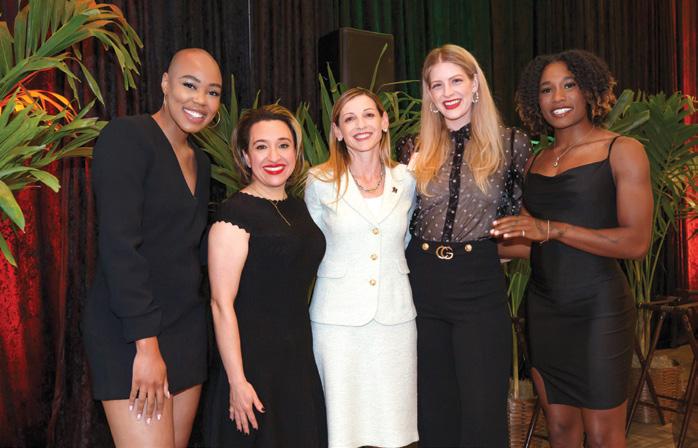
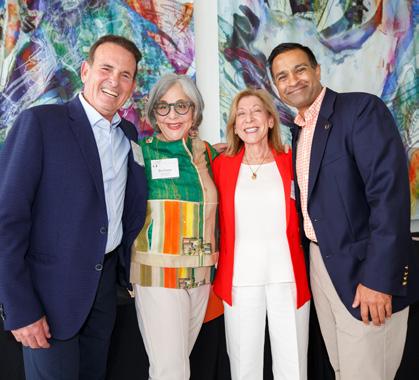
Like Atherley, each credited the University of Miami with helping them reach their goals— in competition and in the classroom.
“I’ve had such a great group, great team around me. I have the best friends I could ever ask for on the soccer team, on the volleyball team and they’re all out there today, too,” said Byrne, who hails from Ireland and has navigated being far from home during her time at Miami. “They have made this whole experience the best. And I think not many universities have that kind of camaraderie within the sports. I think they have made my life super, super easy, that’s for sure, in the transition.”
Vallée added, “I’ve met just amazing people who have helped me. I’m doing my master’s right now with a professor who is completely on board with my diving … It’s been a really great journey getting here.”
With this year marking the 10th
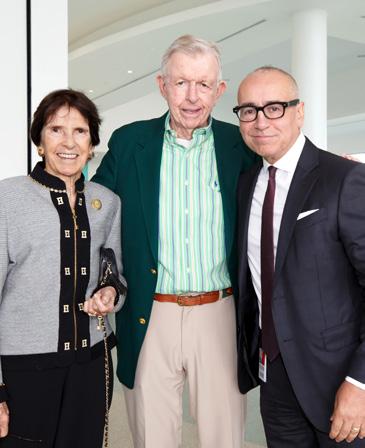
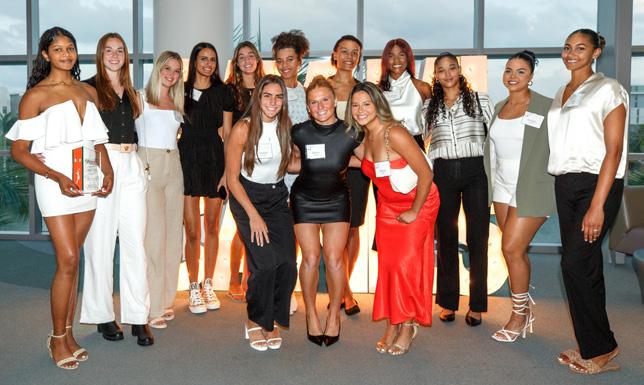
anniversary of the Celebration of Women’s Athletics, there was a focus not just on the current student-athletes making an impact at Miami, but on some of the pioneers that came before them, including Isabella Hutchison, who served as the women’s athletic director from 1965 through 1979, and former women’s basketball coach Katie Meier, who earlier this year announced her retirement after coaching the Hurricanes for 19 seasons.
Both Hutchison and Meier attended the celebration, as did former University President Donna Shalala, who established the Edna C. Shalala Fund for Women’s Athletics in 2011 to honor her mother, Edna, on her 100th birthday.
Deputy Director of Athletics Rachelle Paul told Hutchinson before the event: “I am here, and we are all here because of you, because of your vision, and because of what
you were able to do all those years ago.”
Even with all the accomplishments garnered by the talented student-athletes, Paul said in her remarks that the goal now is to continue building on their achievements and continue affording talented, young women opportunities to excel.
“It’s hard to put into words how special this is, to recognize the tremendous accomplishments of our female studentathletes,” Paul said. “To hear their names, and to know they are competing at the highest level in their sports, it’s wonderful to see, especially as a former student-athlete myself.”
Paige Yaroshuk-Tews, the Hurricanes’ head women’s tennis coach, added, “I think it’s unbelievable, right? For our student-athletes to see and feel the support in the room, I think this is just essential for their development, to see and feel and hear the support. I think it goes so far.”
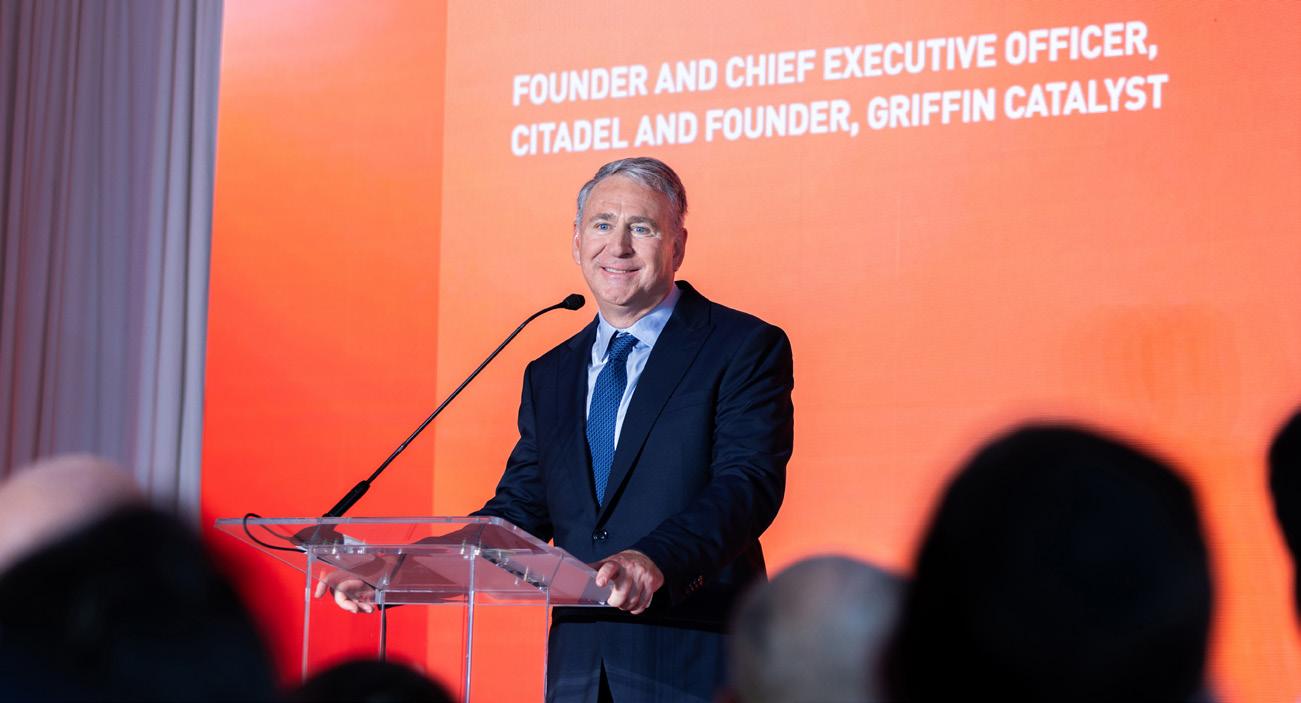
Businessman and philanthropist
Kenneth C.
Griffin was celebrated in March for his transformational $50

million gift to Sylvester Comprehensive Cancer Center, marking a new chapter in Sylvester’s relentless quest for a cure.
Kenneth C. Griffin is filled with a hope shared by millions the world over: that one day soon, the scourge of cancer will be eradicated. It is an illness, he says, “that can be so tragic, so painful, and so devastating. But it represents our shared belief that we will bring this disease to its rightful end.”
Griffin’s hope for cancer’s end was amplified this past March
when dozens of invited guests gathered for the Gift of Light, a celebration held on the Schoninger Research Quadrangle in the heart of the University of Miami Medical Campus to recognize Griffin for his $50 million gift to Sylvester Comprehensive Cancer Center. Sylvester is the only National Cancer Institute designated cancer center in South Florida and part of the University of Miami
Miller School of Medicine and UHealth— University of Miami Health System.
Griffin’s landmark donation will help fund the 12-story, 244,000-square-foot Transformational Cancer Research Building, allowing Sylvester to double its research footprint, accelerate efforts to develop new therapies, enhance care for patients, and expand access to clinical trials.
In recognition of the gift, the facility will be named in Griffin’s honor as the Kenneth C. Griffin Cancer Research Building.
“A vital catalyst for our growth and our focus on what is possible” is how Dr. Stephen D. Nimer, director of Sylvester Comprehensive Cancer Center and the Oscar de la Renta Endowed Chair in Cancer Research, describes Griffin’s gift.
“What we have been building together is not just the building,” Nimer says. “It’s a symbol of our shared commitment to turning our vision into reality—a place where we can continue to push the boundaries of what’s possible, not only for the 6.2 million people who live in South Florida but for our nation and beyond. Together we are building a destination cancer center with world-renowned physicians and researchers committed to excellence and with skilled and dedicated staff who deliver compassionate, lifesaving care.”
Dr. Dipen J. Parekh, chief operating officer of UHealth and the founding director of the Desai Sethi Urology Institute, says Griffin’s “generosity will strengthen the foundation of the new [cancer research] building, but even more meaningful is how it will further strengthen the spirit and resolve of 20,000 warriors who answer their calling every day within our health system.”
Miami-Dade County Mayor Daniella Levine Cava calls it “transformational,” adding that it will “light the way for a healthier MiamiDade County,” where more than 12,000 families are impacted by cancer each day.
The Gift of Light event took place on 305 Day, Miami’s day of self-celebration, and during the event, Cava declared Griffin “Mr.
305” in recognition of his many contributions to the city
Griffin, who grew up in Boca Raton, Florida, and moved to Miami-Dade County two years ago, is the founder and CEO of the multinational Miami-based hedge fund firm Citadel and founder of Griffin Catalyst, the civic engagement initiative that encompasses his philanthropic and community impact efforts. Griffin has long been committed to pushing the frontiers of science and medicine to drive progress and improve lives.
University of Miami trustee Stuart Miller, who chairs the UHealth Board of Directors, praises Griffin for his philanthropic impact, noting that the entrepreneur has provided more than $2 billion to support efforts that expand opportunity and improve lives at scale.
“Since moving his Citadel headquarters to Miami in 2022, Ken promptly made his mark on our city,” recounted Miller, whose own family made a $100 million gift to name the University’s medical school in 2004. “Among his first philanthropic endeavors was the extension of a groundbreaking effort he originally championed in Chicago to bridge the digital divide, known here as Miami Connected.
“[Griffin] partnered with Miami-Dade Public Schools’ Achieve Miami and other organizations to bring free broadband connectivity, digital literacy, and career opportunities and technology to more than 100,000 students across our community.”
Griffin calls his decision to support the University’s health care system one of the easiest he’s made in recent history. “I find my own personal care here, as does my family,” he says. “The doctors are remarkable. Their compassion is incredible. It is a remarkable institution. It’s one that we should all be proud of as people who live here in Miami.
“There is no doubt that Sylvester will continue to be at the forefront of science and care and at the forefront of saving people’s lives,” Griffin continues. “With this team, we
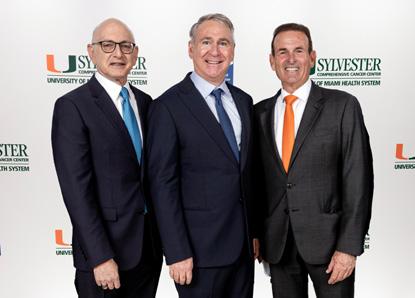

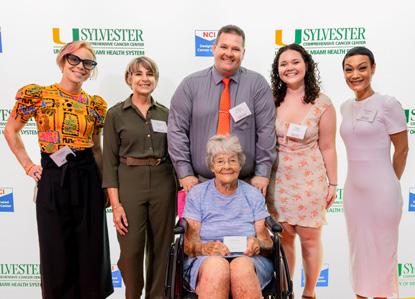
are leading the way to being one day closer to achieving our shared goal of ending the threat of cancer in our lifetime.”
One of the 18 million cancer survivors in the U.S., Miami-Dade resident Iliana Suarez said she can’t wait to see what new research will develop because of Griffin’s gift.
“I’m cancer free for six years now, and I owe it all to the dedication and caring attitudes of the doctors and nurses at Sylvester,” she declares. “I’m sure Ken’s gift will only lead to better lives for many other people who are fighting the disease.”
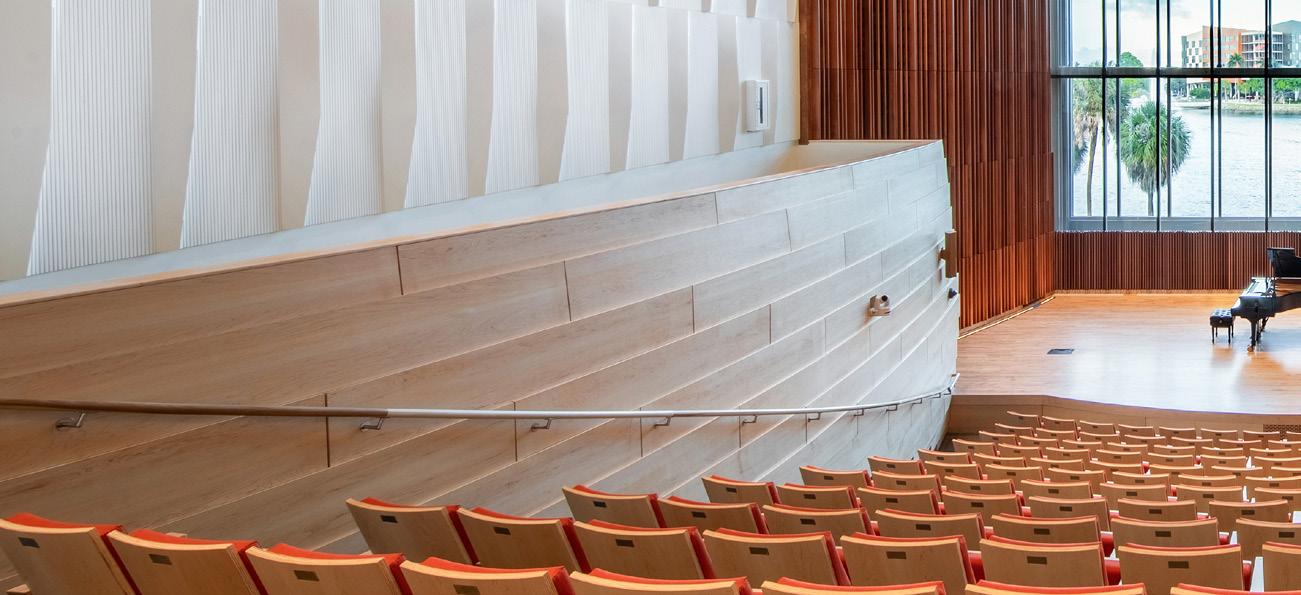
Robert and Judi Prokop Newman exemplify the power of philanthropy.
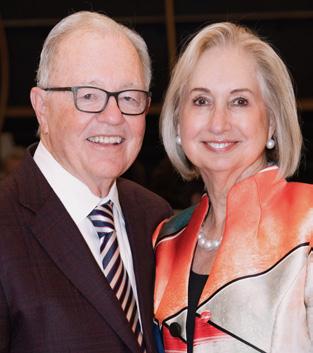
Judi Prokop Newman, B.B.A. ’63, and her husband, Robert Newman, Hon.’08, have been paying it back by paying it forward ever since she graduated from the University of Miami some 60 years ago.
“I was so grateful for my scholarship, because it really did change the trajectory of my life, that when I graduated, I immediately started giving back to the University,” Judi says. “I started by giving $25 every year and since, it has grown quite a bit.”
Today their collective generosity includes multiple endowed scholarships, a building for alumni gatherings, and now, a recital hall at the Knight Center for Music Innovation at the Phillip and Patricia Frost School of Music.
Since its opening last November, the stunning 25,000-square-foot Knight Center, dedicated to combining performance and technology, has ushered in a new era of music performance and instruction at the University of Miami. The 200seat recital hall, with its picturesque wall-sized window overlooking Lake Osceola, features crystal-clear acoustics from front to rear.
“Reflecting ongoing, selfless support by two remarkable philanthropists, the Robert and Judi Prokop Newman Recital Hall is a visually stunning and acoustically unmatched venue. This new jewel on the Frost School of Music campus will benefit generations of deserving students who come to study and grow in one of the world’s greatest music schools,” declares Shelton G. Berg, dean of the Frost School. “Time and time again, Judi and Bob put students first by making transformative gifts, and the Newman Recital Hall is the latest game-changer they have empowered.”
“We felt particularly called to this project because we view
the Frost School as a star in the music education universe and a magnet for the University,” Judi reflects. “This beautifully designed space nicely complements the tremendous talent at the school and will provide a wonderful venue for expression, creativity, and joy—both for students and the community.”
Judi Prokop Newman’s philanthropic relationship with the University of Miami began when she received a small scholarship that enabled her to pursue her dreams of higher education.
As a young girl growing up in St. Louis, Missouri, she was unsure whether she would even be able to attend college. But as she listened to high school classmates enthusiastically describe their college plans, she thought to herself: “Well, why not me?”
“My mother said that my role in life was to become a secretary or a bookkeeper, get married, have children, and then move into the house next door to take care of her in her old age,” Judi recalls. “My parents didn’t really see a need for me to go to college, but after much prodding, they agreed to let me go if I could get a scholarship.”
Then one day, while thumbing through college pamphlets, Judi stumbled upon the University of Miami with its green palm trees, blue skies, and vibrant spirit. “I studied the brochure, weighed it against other options, and immediately decided to apply for a scholarship,” she says. “Lo and behold, I received one.”
She left Missouri to study accounting at the University of Miami and, after three years and one summer session, graduated with honors from the business school.
After graduation, Judi worked as a computer programmer at a major aerospace company in Los Angeles. There, she met and fell in love with another young computer programmer named Bob Newman. Judi jokingly calls it the first computer dating.
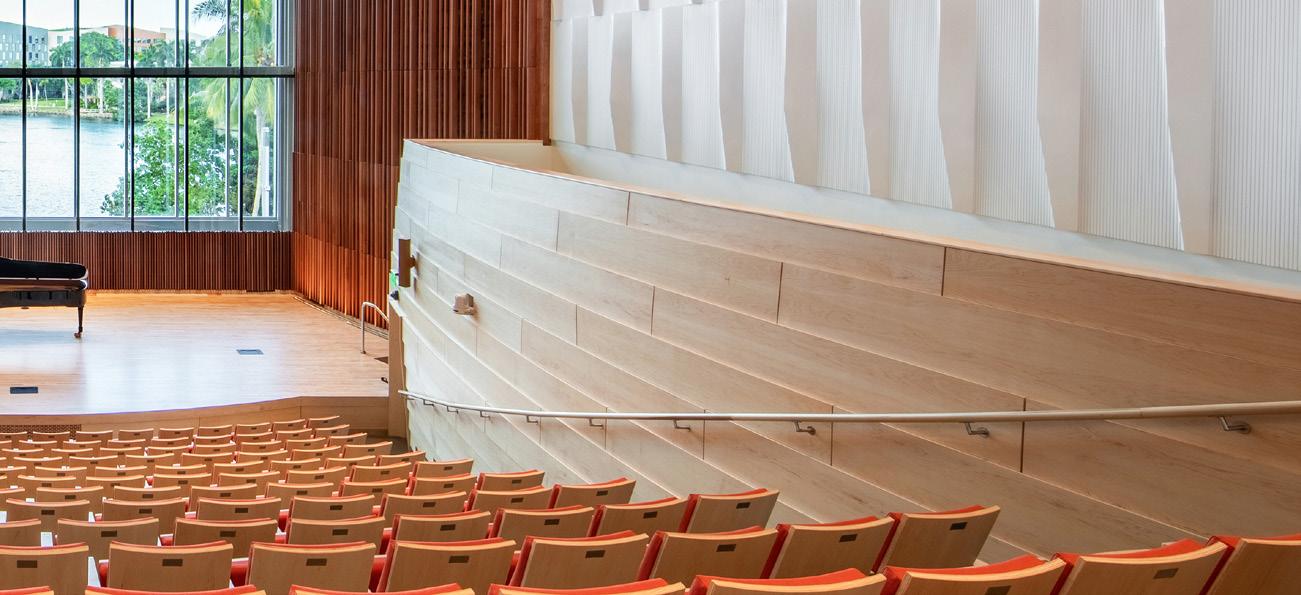
They married, started a family, and led distinguished careers. Judi became essential to operations at United Airlines, acting as the director of several departments over the years, including airframe maintenance systems, computer operations, relationships with hotel and rental car companies, reservation systems, and airline metrics and measurements.
Bob worked as a computer programmer and information technology consultant for
“It’s very rewarding to know that I’m helping talented people follow their dreams and find success.”
—Judi Prokop Newman
several years before leaving to start his own business designing and developing software for medium-sized businesses. His company eventually grew into one of the world’s largest application software providers.
As their successes grew, they found themselves in a stronger position to help others. Judi joined the University’s Board of Trustees, and she and Bob began investing in the University’s academics, arts, and culture.
The couple gave to scholarships across
schools and disciplines at the University, establishing the Judi Prokop Newman Endowed Scholarship at the Miami Herbert Business School, the Robert and Judi Prokop Newman Endowed Music Scholarship at the Frost School of Music, the Robert and Judi Prokop Newman Endowed Athletic Scholarship, and even creating the Newman Alumni Loyalty Scholarship Endowed Fund, a matching gift fund to encourage alumni to support scholarships at any level.
“Imagine if we all gave back, even just a little. Just think of the impact we could make by paying it forward to today’s students,” Judi says.
In 1999 Judi returned to the business school to establish the Judi Prokop Newman Information Resource Center, giving business students access to an extensive research library staffed by specialized advisors.
In 2005 the couple made the lead gift
to build the Robert and Judi Prokop Newman Alumni Center as a place for former students to foster and celebrate their connection with the University. They hope the center will continue opening new doors and creating new opportunities for future generations of students and alumni.
“We thought it was important to encourage alumni to connect with the University and continue their relationship with their alma mater,” Robert says. “Ultimately, alumni support and success only further the positive reputation of the institution, attracting quality students and enhancing the value of a University of Miami degree.”
In 2008 the University of Miami made Robert an honorary alumnus in recognition of his unwavering loyalty and support.
It’s difficult to measure the true impact of philanthropy at any size or amount. But for a young woman with big dreams in St. Louis, Missouri, one small scholarship made all the difference.
“I continue to give because a scholarship changed my life, and I want to see if I can positively change the lives of others,” Judi says. “It’s very rewarding to know that I’m helping talented people follow their dreams and find success.”
Funded through a bequest from Mary Cosford, the Bill Cosford Director of the School of Communication’s semester in LOS ANGELES leads a 14-week residential program in which students gain professional experience in the Los Angeles film and television industry.
Donor support enables upper-level undergraduate and graduate students in the School of Architecture to spend a semester in ROME for an intensive experience in design, drawing, urban design, and the history and theory of architecture.
The Bermont/Carlin Scholars Program enables outstanding finance students at Miami Herbert Business School to travel to NEW YORK CITY to pursue career placement opportunities with top-tier investment banks, commercial banks, real estate firms, and other finance-related businesses.
Since learning that there were no ophthalmology, optometry, or optical shops on Isabela Island, the largest of the GALAPAGOS , Bascom Palmer physicians and students participating in The Darwin Eye Project have delivered eye care and recurring treatments to more than 1,100 residents.
Amy Zanne, professor of biology and the Aresty Chair in Tropical Ecology, has recently conducted field research in BRAZIL , exploring how plant traits and environmental conditions influence ecosystem-scale carbon cycles under current and future climates.
Sylvester Comprehensive co-sponsored the African Consortium conference in Drs. Sophia George and Matthew to understand factors driving burden of cancer in people to promote equitable
The Troob Family Student provides summer funding School of Education and Most recently, students to BELIZE to teach vulnerable young people

Comprehensive Cancer Center African Caribbean Cancer MOMBASA, KENYA
Matthew Schlumbrecht seek driving the disproportionate people of African ancestry, and equitable outcomes.
The Patti and Allan Herbert Frost School of Music Program in SALZBURG gives aspiring singers an extraordinary opportunity to hone their art through masterclasses, one-on-one coaching, and German-language certification—all against the backdrop of the renowned festival.
The LawWithoutWalls program unites School of Law students with their peers from 30 law and business schools worldwide to co-create innovative solutions to problems at the intersection of law, business, and technology. The most recent LWOW Sprint took place in MADRID .
Supported by gifts to the Dean’s Discretionary Fund, the Departments of Biomedical Engineering and Mechanical and Aerospace Engineering offer summer study abroad in KYOTO, JAPAN , giving students the opportunity to learn different methods of cellular engineering and manufacturing.
Student Support Fund funding for students in the and Human Development. students and faculty traveled teach financial literacy to people aged 12 to 14.

The School of Nursing and Health Studies Simulation Hospital’s award-winning Clinical Education in Human Trafficking curriculum teaches students and faculty to recognize when a patient may be a victim of this WORLDWIDE scourge.
Ben Kirtman, professor of atmospheric sciences and the William R. Middelthon III Endowed Chair of Earth Sciences at the Rosenstiel School of Marine, Atmospheric, and Earth Science, works to improve our understanding of the El Niño phenomenon, the better to predict extreme weather events AROUND THE GLOBE .
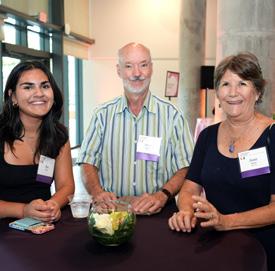
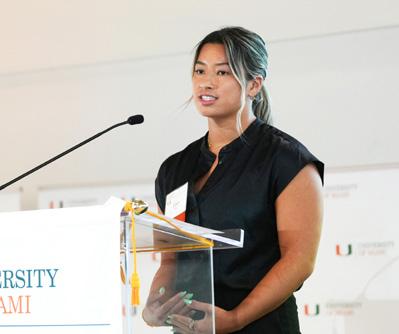
In what has become a cherished springtime tradition, University of Miami students and leaders gathered for the 2024 Scholarship Donor Celebration to express their gratitude to the donors whose generosity brings brighter opportunities within reach. The Black Alumni Society and Center for Global Black Studies also held a reception to celebrate their outstanding scholarship and grant recipients.
From unexpectedly diving into campus television as a freshman to interning at ESPN as the only sophomore on the team and working at The Wall Street Journal, Derryl Barnes’ trajectory defied expectations.
Barnes, a graduating senior pursuing a degree in broadcast journalism at the University of Miami School of Communication, recognized that his path as a Miami Hurricane was made possible by the support of scholarship donors.
“That all happened because I came here—to the University of Miami,” Barnes says. “I was never supposed to be here, and I’m only here because of people like you choosing to invest in students like me.”
At the 2024 Scholarship Donor Celebration held in April, students and leaders gathered at the Lakeside Village Expo Center on the Coral Gables Campus to express their gratitude and appreciation to the scholarship donors whose philanthropic vision make it possible for thousands of students to attend the U.
Lucy Ho, a graduating senior majoring in biomedical
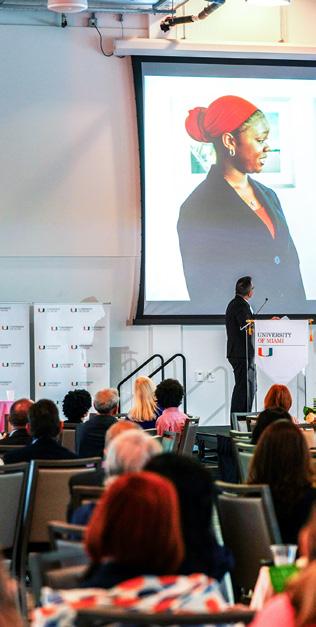
engineering, shared how scholarship support has profoundly impacted her life.
Driven by a desire to explore the intersection of science, research, and innovation in biomedical engineering, Lucy’s journey was shaped by her grandmother’s influence and her own aspirations. Lucy expressed her gratitude, emphasizing how the support she received validated her dedication and allowed her to make her dreams a reality.
“The scholarships I received helped me recognize the hard work I put towards my studies while helping me further chase my future goals,” Ho says.
Ethan Tieu, a sophomore majoring in computer science, credits his scholarship with allowing him to continue a music education initiative he started in high school that provides 3D-printed violins and lessons to communities in Tanzania and Kenya. “I would not have been able to take advantage of all of these opportunities if I hadn’t received my scholarship,” Tieu says.
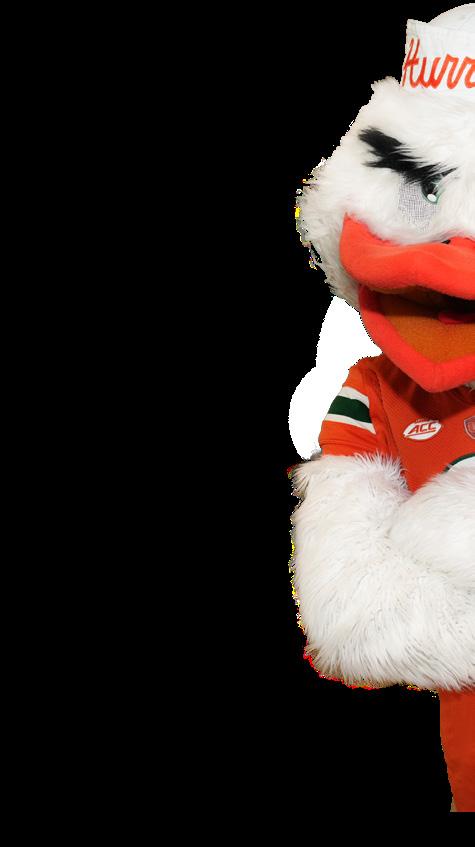
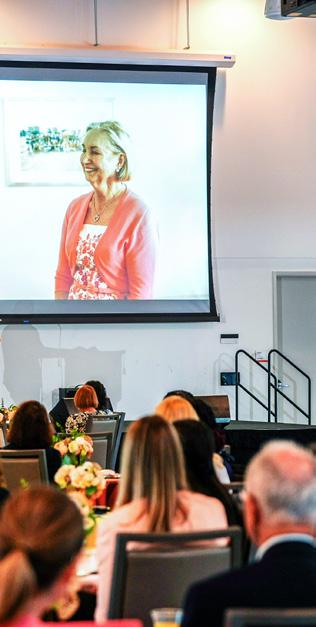
Grecia Rivera, a graduating senior majoring in modern artist development and entrepreneurship, dreamed of being a musician since she was a child in Puerto Rico. “When I received a scholarship, I remember calling my mom. She was crying, I was crying,
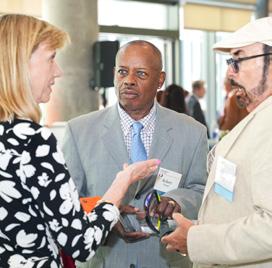
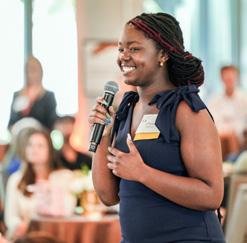
’05, interim executive vice president for academic affairs and provost, recognized the incredible outcomes that scholarships create for individuals, sharing how he benefited from such support as an undergraduate. Prado explained that scholarships and the donors who make them possible “generate a cycle
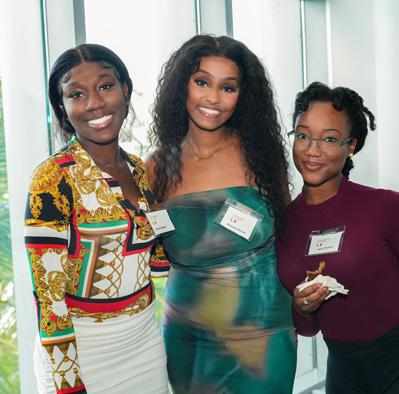
Alumni Society (UMBAS) and the Center for Global Black Studies hosted a reception honoring recipients of scholarships funded by contributions from UMBAS members and summer research grants from the Center.
The ceremony invoked the spirit of the University’s trailblazing Black alumni— beginning with the late Benny O’Berry, B.Ed. ’62, the U’s first Black graduate—and hailed the next generation of Black student scholars.
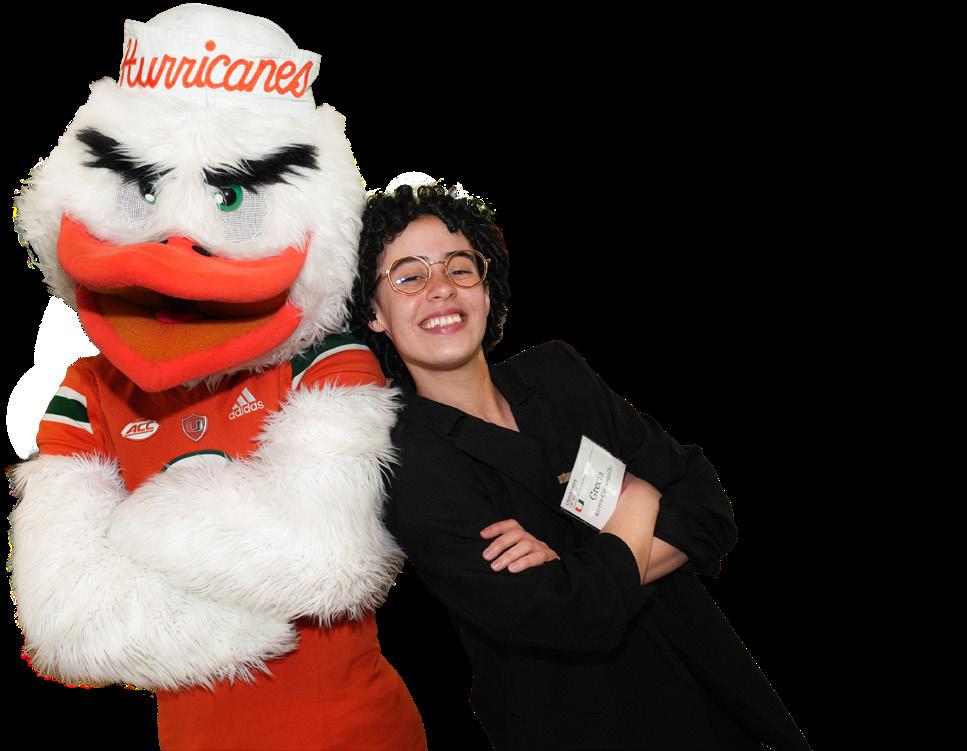
As Patricia A. Whitely, Ed.D. ’94, senior vice president for student affairs and alumni engagement, remarked, the event showcased the strength of the Black alumni community, and the importance of coming together to ensure bright futures for students. In the past 20 years, UMBAS has raised nearly half a million dollars and helped more than 200 students.
Whitely reminded the students being honored of the legacy they are called to represent. “[Black alumni] are very invested— they sat where you are,” she said in her remarks. “Some of them 45 years ago, some 30 years ago, some 10 years ago, and some three years ago, and they are incredibly committed to continuing to foster great scholarship and Black excellence. They want that to happen— and all of you are part of that commitment.
“Investing in our students ensures that we continue to honor the promise made more than 60 years ago.”
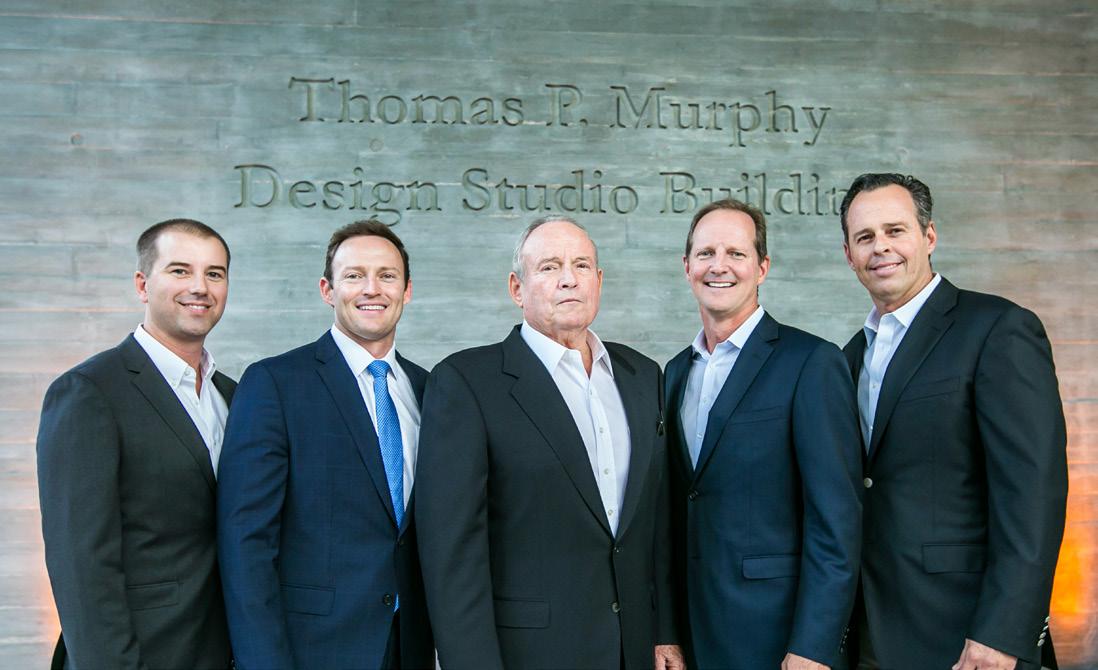
Philanthropist and South Florida construction leader Thomas P. Murphy, Jr., has long supported the mission of the School of Architecture. He has cemented his legacy with a gift to the construction management program, now named in his honor.
Twenty years ago, Thomas P. Murphy Jr., a powerhouse in the Florida construction industry, saw a need to prepare the next generation of builders with hands-on training and proficiency with cutting-edge technology.
He approached the University of Miami to create a construction management track and the idea swiftly became a reality with the support of the School of Architecture. Recently, the University recognized Murphy for his vision by naming the Murphy Construction Management Program.
The program’s interdisciplinary, project-based curriculum integrates technology into flexible learning spaces where students gain hands-on, practical experience. A stellar lineup of industry partners help steer the program’s mission, mentor students, and provide professional experience through internships and practicums in their respective organizations.
The naming of the Murphy Construction Management Program also celebrates Murphy’s most recent gift to the University, which will support scholarships for and enhance the learning experiences of students enrolled in the Master of Construction Management and Executive Master of Construction Management degree tracks.
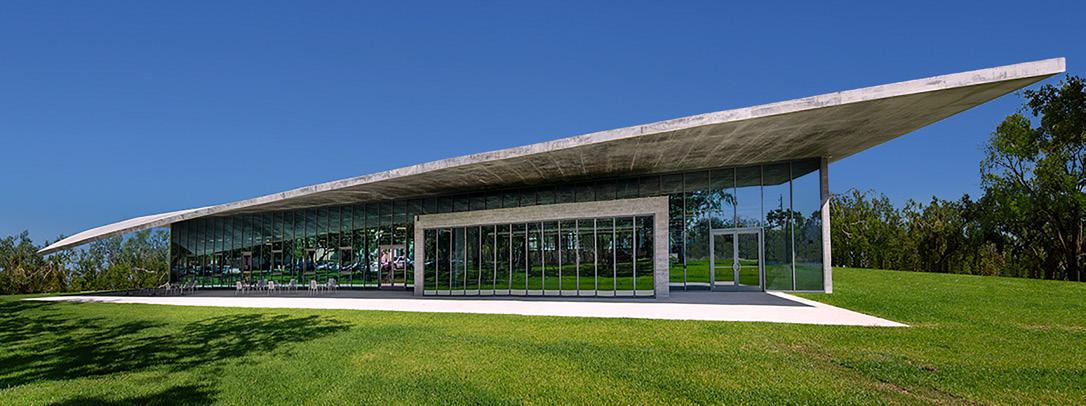
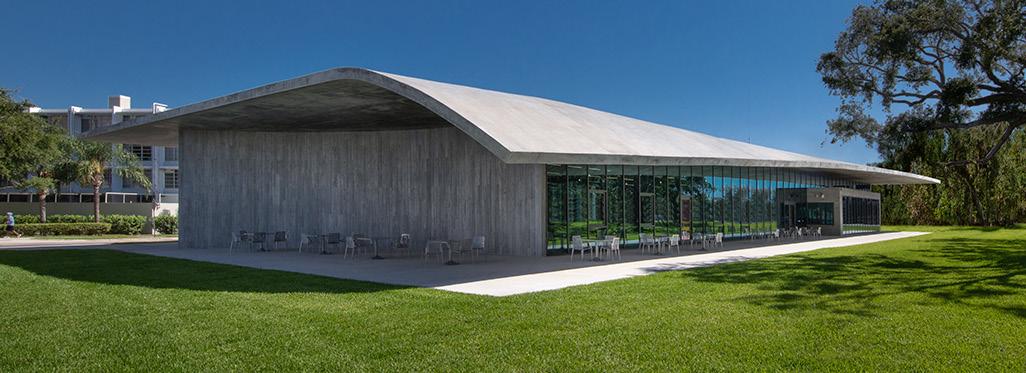
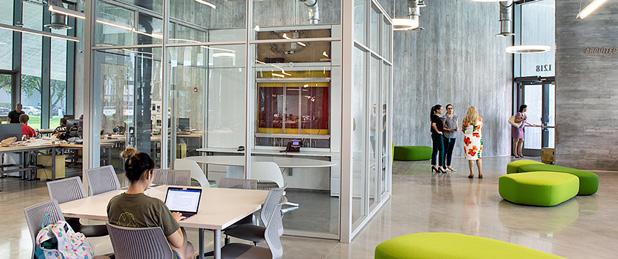
It was at the University of Miami in 1968 that Murphy launched his career in construction. As a 19-year-old student, he became the youngest licensed contractor in Florida’s history. At the age of 20, he started his construction company.
Years later, he returned to campus as a successful businessman—as the founder, chairman, and CEO of Coastal Construction, an award-winning company with a distinguished roster of clients and many highprofile projects across Florida.
In 2014 Murphy made the naming gift, in honor of his father, to create the Thomas P. Murphy Design Studio Building, a state-of-the-art facility at the School of Architecture designed by Arquitectonica and built by Coastal Construction. Upon its debut, the Murphy Design Studio Building received multiple awards, including the 2018 Building of the Year from World-Architects, a prestigious worldwide network of architects and building professionals.
A LEED-certified, 20,000-squarefoot facility housed in an elegant concrete
has been recognized with numerous awards for its innovative design. This design not only offers a conducive space for learning and studying but also serves as an educational tool by demonstrating fundamental principles of modern architecture.

and glass structure, the Murphy Design Studio Building incorporates a leading-edge fabrication lab and workstations that enable advanced digital production. Students can prepare for modern collaborative workspaces with the building’s flexible floorplan and present final projects before peers and faculty in the indoor and outdoor jury areas.
Murphy’s support of the School of Architecture and its construction management program demonstrates his commitment to building and maintaining a strong pipeline of construction talent in South Florida.
“It is an honor to continue supporting the University of Miami School of Architecture and now the construction management
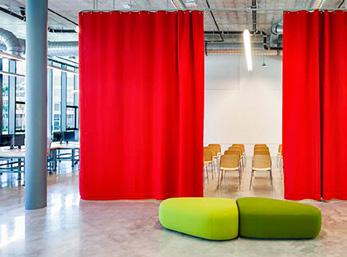

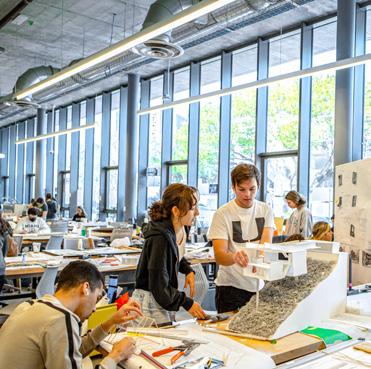
program,” Murphy says. “Supporting these bright young minds, who will become the next generation of builders, is very important.”
“Education has the power to transform lives, and we believe that every talented individual deserves equal access to educational opportunities,” says Rodolphe el-Khoury, dean of the School of Architecture. “With this endowment, we are investing in the potential of future construction management students, enabling them to make a lasting impact on the industry.”
Donor support is making a world of difference for aspiring documentary filmmakers studying at the School of Communication.
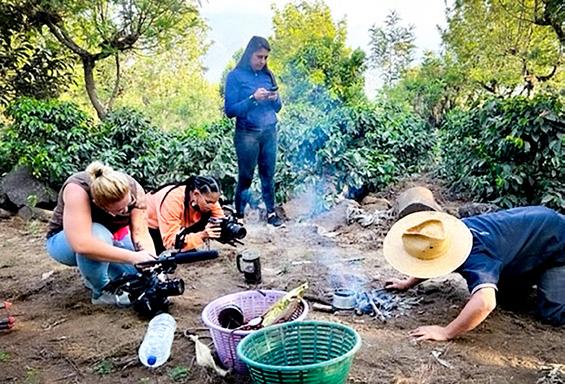
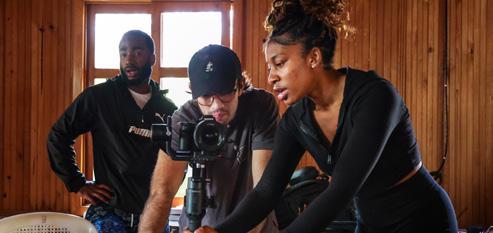
Documentary film students at the University of Miami School of Communication (SoC) learn through a fusion of cinematic and journalistic approaches to storytelling.
A crucial, donor-supported element of the curriculum is the Guatemala Production Outreach Program, a one-week, study abroad experience in which students are paired with nonprofit groups in Central America. Local leaders and changemakers tell their stories in collaboration with SoC students on short, nonfiction films.
“Introducing documentary students to the realities on the ground in developing countries is a priority for the School of Communication,” says Sanjeev Chatterjee, director of the documentary Master of Fine Arts program within the Department of Cinematic Arts. “While the Guatemala program is supported through philanthropy to a great extent, the very process of filmmaking and getting the important and impactful work in front of audiences remains expensive and often out of reach for students.
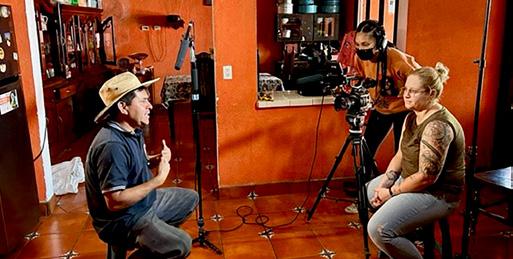
They can use all the support they can get to take their work forward.”
Two recent student participants say it was a life-changing experience. “Being in Guatemala was an incredible experience for which I was extremely grateful,” says Aria Harrell, an undergraduate film major. “Because of the donor support that made this project possible, I felt a duty to produce something that would really make a difference. It made me more ambitious to do some good work.”
Harrell documented the plight of a family in Guatemala who were forced to prepare their food with wooden stoves that filled their home with smoke. Cooking over open fires is commonplace worldwide, but the practice often leads to respiratory problems affecting children and adults. Harrell teamed up with a local organization, Ecocomal, which provides smokeless stoves to residents. The result was the award-winning documentary “Respirando Vida Nueva,” or “Breathing New Life.”
The trip also enabled M.F.A. student Zanolee Grant to produce her documentary, “Dreams of Harvest.” The film focuses on an independent coffee grower and his family. Grant collaborated with De La Gente, a nonprofit that works with small coffee farmers in Guatemala, to help them become financially self-sufficient.
“Without philanthropic support, I would not otherwise have been able to go to Guatemala and tell this important story,” says Grant. “It was a once-in-a-lifetime experience, and it drove home the opportunities that happen because generous people give back to support our school.”
Julie and Martin Franklin say it “feels right” to commemorate the work of Julie’s father with a donation to the school he loved.
Calling her father, renowned orthopaedic surgeon, Dr. Ronald Hinds “as special as they come,” Julie Martin looked for an equally special way to honor his legacy when he passed away a year ago at 89.
Together with her husband Martin, they made a $3.75 million gift to establish an endowed chair in his name at the Miller School of Medicine.
“I wanted to do something to honor my father, and it feels right to pay tribute to him and his memory at the University of Miami,”
Esformes Endowed Chair in Medicine and Endocrinology and the Kathleen and Stanley Glaser Distinguished Chair at the Miller School. “The leader who will occupy this endowed chair will set the pace for excellence not only in this generation but for generations
father-in-law and say thank you.
“We are very grateful to Dr. Roy Weiss for the first-class care he provided to me when I needed it,” says Martin, who serves as chairman of Nomad Foods Limited, Element Solutions, Inc. and APi Group. “We know
“ The incredibly generous gift from Julie and Martin Franklin will ensure in perpetuity the finest in scholarship and clinical accomplishment in the Department of Medicine.”
—Dr. Roy Weiss
says Julie Franklin, who grew up in Miami. “My father loved Miami and the University and, to me and my husband Martin, the two are tied together like the roots of a tree from which all the branches grow.”
The Dr. Ronald B. Hinds Department of Medicine Endowed Chair will support the research pursuits of a senior faculty member.
“The incredibly generous gift from Julie and Martin Franklin will ensure in perpetuity the finest in scholarship and clinical accomplishment in the Department of Medicine,” says Dr. Roy Weiss, professor and chair of medicine, the Rabbi Morris I.
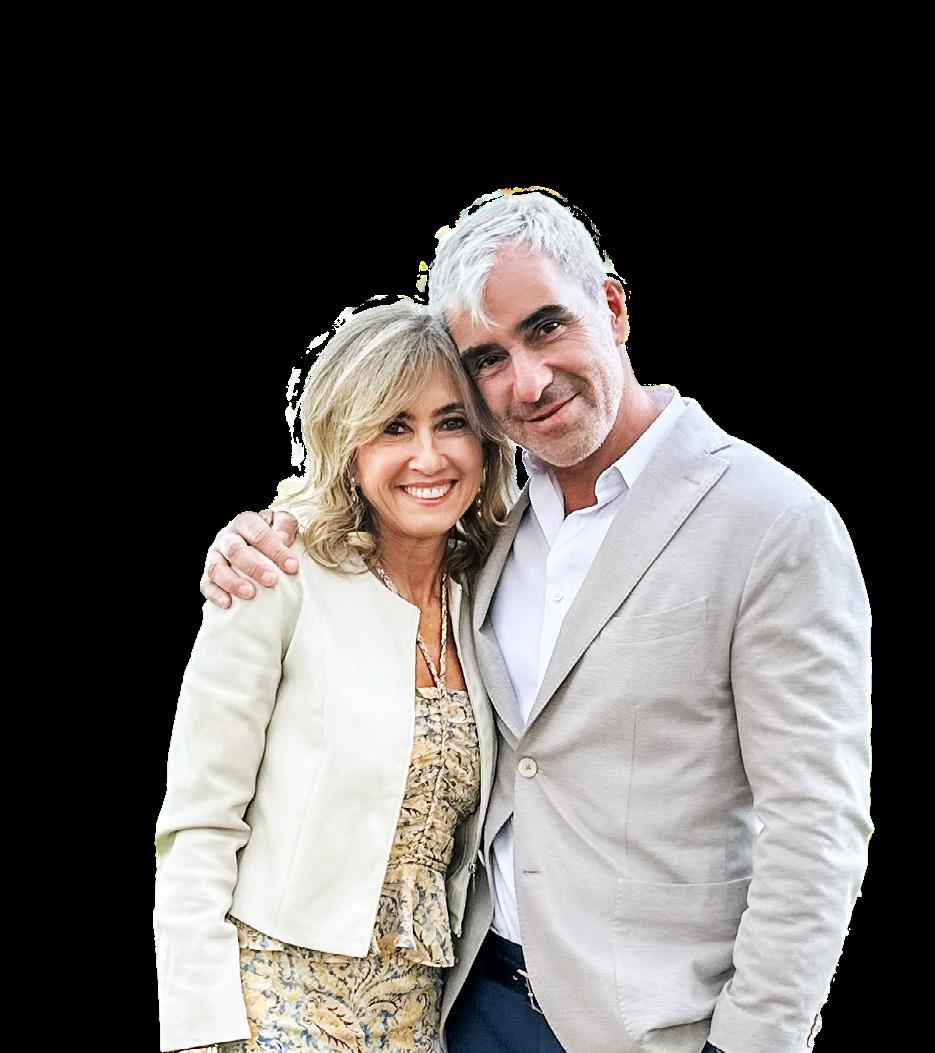
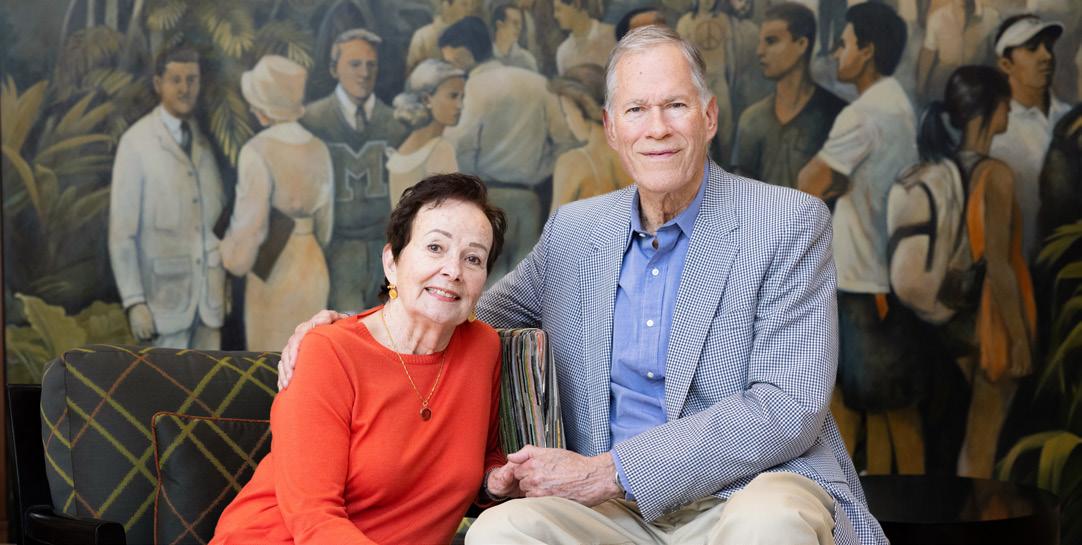
His parents’ generosity enabled Lloyd Straits and his wife, Ruth, to earn college degrees without incurring debt. Now they are paying it forward with a planned gift to endow a scholarship at Miami Herbert Business School.
As a student at the University in the early 1960s, Lloyd Straits, B.B.A. ’65, was grateful for the support of his parents, for whom education was of the utmost importance and who had the financial resources to pay for it. Their generosity left him and his future wife, Ruth, debt-free when they got their degrees.
“It is quite extraordinary when you think about it,” explains Straits. “My father was born in 1894, and my mother in 1904. It was a time when many people didn’t even finish high school, let alone college. My father became an attorney, and my mother had a master’s degree in fine arts from Columbia University. They had me very late in life and were set financially, so they could pay for my education—and help my wife Ruth as well.”
In gratitude for the good fortune that set Straits and his wife on a solid life trajectory, the couple have made a planned gift to endow a scholarship at the University of Miami Patti and Allan Herbert Business School, opening doors to opportunity for future generations of students.
Straits said his parents’ example prompted him and his wife to establish the Lloyd A. and Ruth L. Straits Scholarship. The
scholarship fund will eventually be endowed through a planned gift the Straits made back in 2005. Since then, they’ve twice increased the value of the planned gift.
“We have no children, and this is our opportunity to help young people the same way my parents helped the two of us,” says Straits, who graduated from the University in 1965 with a degree in business. “I truly credit my education as a business school student at the University of Miami with all the success I’ve had in my professional life.”
Straits spent most of his career in international finance, first with two prominent New York City banks and later in various management positions with Northrop Grumman. Now retired, he and Ruth divide their time between homes in Montana and Fort Lauderdale, Florida.
As Straits contemplates his and Ruth’s legacy at the University, he thinks about the students who will eventually benefit from their generosity. “As our investments have grown and more resources became available, we wanted to ensure that our scholarship would make a financial difference for business school students.”
Real estate developer and Miami Hurricane parent Mark E. Carbone seeks to ensure that talented students are able to pursue their educational dreams at Miami Herbert Business School.
Making sure the best and the brightest have the opportunity to attend the Patti and Allan Herbert Business School regardless of their financial means was the driving force behind an extraordinary recent gift from Mark E. Carbone.
The New York real estate developer has pledged more than $3 million through his education foundation to create the Mark E. Carbone Education Foundation Future Business Leaders Endowed Scholarship.
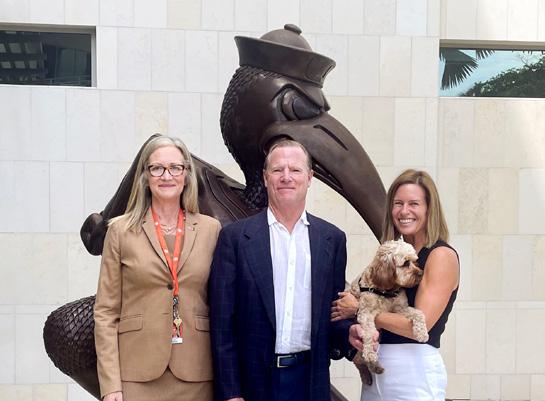
“Over the past quarter-century, I have become very familiar with the University of Miami through my previous work at The Related Group, and now my son is a student at the University,” Carbone recounts.
“I believe, like the city of Miami, the University is on an upward trajectory as it experiences a tremendous amount of growth. I want to play a role in that growth by ensuring the business school is able to attract the best students possible.”
While Carbone feels strongly about enrolling talented students, he feels equally as strongly that financial resources should not stymie those same students.
“My ideal student for this scholarship would be someone who is very hard-working, smart, hungry, comes from a family of lesser
means, but still has good emotional support from their family, and could really use the financial help,” explains Carbone.“Education is the most important foundation for someone’s life. If someone can’t go to Miami because they can’t afford it, that’s a shame. They should be able to go regardless of their financial situation.”
Carbone also added an extra $340,000 to the spending account so that the scholarship can be awarded immediately rather than waiting until the endowment is fully funded.
“Mark’s contribution is a real testament to what we stand for at Miami Herbert—that money should never be an obstacle for incredible talent,” says Ann M. Olazábal, professor and chair of the Business Law Department.“This scholarship is not just about financial aid; it’s about nurturing a community rich in diversity
From left, Ann Olazábal, Miami Herbert professor, with Mark Carbone, his partner Jeanne Dillon, and their dog, Lulu.
and brimming with potential.”
Carbone’s involvement doesn’t end with his scholarship. He also serves on the business school’s parent’s council and the dean’s advisory council.
Hari Natarajan, a professor and vice dean of business programs at the school, worked with Carbone over the past several years to ensure the scholarship met the needs of the appropriate students and the school.
“Mark firmly believes in the trajectory of the business school and where we are headed,” says Natarajan.“Partnering with someone who not only asks pertinent questions but also deeply believes in our potential for expansion is invaluable. We are immensely grateful for the opportunity to accept such a generous donation.”
Natarajan oversees all the school’s inperson undergraduate and graduate degree programs.“We aim to develop transformative scholarship and principled leaders,” he says. “When you have scholarships like this, it gives us the ability to find the best and brightest regardless of their economic means. This enables us to bring them onboard and train them to fulfill our mission.”

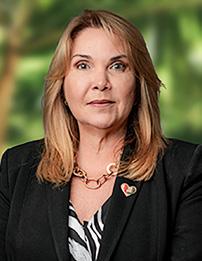
Blanca Ripoll began working at the University of Miami in 1986. Calling the University her “home,” she has been a loyal donor for over 38 years.
“I started at the medical school very early in my career,” Ripoll says. “I thought the University was a great institution and I planned to stay for three to four years to build a solid resume; instead, it turned into this amazing journey spanning nearly four decades.”
Ripoll now works as the executive director of events management, building operations, and special projects at the Miami Herbert Business School.
“I like to get involved every year and give back at every opportunity,” she says. “The University is such an amazing, worldclass institution that I know my support goes a long way to help not only South Florida, but also the world.”
Whether she is supporting scholarships or priorities within individual schools, she says it is always an amazing feeling to give back.
Ripoll adds: “No matter the amount, every cent counts when enriching the lives of others.”
Annette M. La Greca, Ph.D., a distinguished professor of psychology and pediatrics at the College of Arts and Sciences and longserving former director of clinical training for the University’s doctoral program in clinical psychology, has dedicated her life to helping youth and families cope with disasters and overcome trauma through her research and dissemination activities. Over
40 million copies of her manuals for parents to help children cope with disasters have been distributed globally. La Greca, a Cooper Fellow and Provost Scholar, has received multiple national and international awards for her work.
La Greca also is devoted to the growth and education of her students. In 2018, she launched an annual distinguished alumni award and colloquium series to help students develop their career paths and form connections with notable University alumni in the field of psychology. Most recently, she made a planned gift to endow a chair in the Department of Psychology, which will support the department’s program and its students.
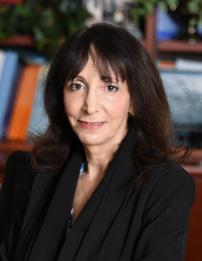
“I am strongly motivated by giving back to others, as I feel I have been very fortunate,” says La Greca. “I see part of my legacy as contributing to others’ intellectual and personal development—and hopefully making the world a better place!”
Kele Stewart generously devotes her time and talent as a champion of children.
As a professor specializing in child welfare, children’s rights, and clinical education at the School of Law, Stewart trains students to defend society’s most vulnerable.
“I try to teach students to be effective legal advocates who find ways to support families,” Stewart says. “I challenge them to be proactive in solving problems and making life better for their clients.”
Stewart also co-directs Miami Law’s Children and Youth Law Clinic, overseeing students representing children and teens dealing with abuse, abandonment, and neglect in Miami-Dade County.
The University of Miami’s faculty and staff are fully engaged in advancing the U’s mission to transform lives through education, research, innovation, and service. Through gifts of their time, talent, and treasure, many go above and beyond to create brighter outcomes in the lives of individuals, the larger South Florida community, and beyond.
In 2017, Stewart co-founded the First Star University of Miami Academy and currently serves as a faculty adviser. This intensive college preparatory program for high school students in foster care boasts a 93% high school graduation rate among students who participate consistently, as compared to the typical 50% rate among foster youth.
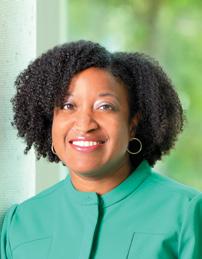
“The University of Miami is one of the rare places where you can wear many hats and advance many goals,” Stewart says. “I get to follow a lifelong goal of bettering social outcomes, but that’s just the beginning. I also train future lawyers, conduct research to unite theory and practice, shape policy, and be proactive in improving opportunities for all children and families.
Motivated by current public health challenges and their decades working to fight HIV, Daniel Feaster, Ph.D. ’01, and his late husband, Michael Uselmann, chose to honor their life’s passion by making a most personal gift.
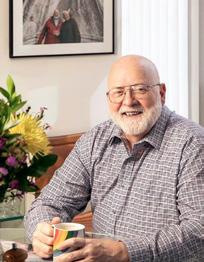
Each has played a vital role at the Miller School: Feaster as a professor and Uselmann as a senior research associate. So, when it came time to plan their estate, the couple decided to make a planned gift, establishing the Daniel J. Feaster and Michael S. Uselmann Endowed Chair in Public Health Sciences—the first ever for the Department of Public Health Sciences—as well as an endowed research fund and an endowed fellowship fund.
“We were both strongly committed to leaving a legacy that could
accomplish something meaningful,” says Feaster, who works in the Division of Biostatistics and is co-director of the University’s Center for HIV and Research in Mental Health (CHARM). “The University of Miami provided a platform and venue for us to do some very important work, particularly with individuals living with HIV, and our wish was always that these endowments would provide the resources to allow others to continue advancing public health.”
For Sue Mullane, B.Ed. ’75, M.Ed. ’77, Ph.D. ’95, professor of professional practice at the School of Education and Human Development, the University of Miami will always be home.
“I have spent my entire adult life here at the University of Miami in one capacity or another—student, student-athlete, graduate student, doctoral student, administrator, parent, alumni leader, professor, donor, and ’Canes fan—I have seen the University through many lenses and witnessed its amazing evolution into to the worldclass academic institution it is today,” she says.
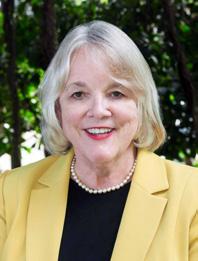
Mullane received one of the first athletics-based scholarships offered to women following the passing of Title IX. A high school All-American diver from Louisville, Kentucky, she moved to Miami sight unseen and never looked back.
She would go on to help the school win a national title in swimming and diving, earn several degrees, and watch her sons graduate from the business school and later marry fellow classmates.
A loyal donor to the University for over thirty years, Mullane says she is happy to give back.
Miami Law alumnus Richard Margolius has made a planned gift to establish an endowed scholarship in the School of Law, enabling others to chase the life-changing opportunities he was fortunate to encounter.
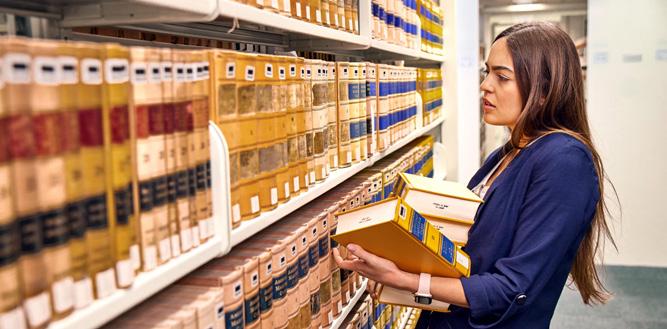
“I truly thought I had zero chance of getting accepted to Miami Law,” recalls the Honorable Richard V. Margolius, aka Ric Zweig, J.D. ’73. Margolius had been attending Ithaca College in New York while actively working as a booking agent in the post-Woodstock music scene.
“I was making good money,” he says, “and I was far from a fastidious student. A graduate degree was probably one of the furthest things from my mind.”
Fortunately, those close to Margolius saw a brighter future for him.
Miami Law students will have brighter opportunities thanks to the endowed scholarship established by Richard V. Margolius.
the Honorable Gerald Wetherington, who was a professor with Miami Law at the time and would prove instrumental in Margolius earning his degree.
“Gerald Wetherington wasn’t even one of my professors, but he stepped up for me at a time when I needed someone the most,” Margolius explains. “There I was, only a week or two from graduation. My family had already made travel arrangements to come down. Then I find out I’m not going to pass a required course because a paper I had turned in had gone missing. [Wetherington] came with me to the professor of the class and negotiated that I could take an exam in lieu of the paper.”
“I [am] indebted to the University of Miami for all it has given to me. I’ve done well in all aspects of life, and it’s all because of the U.”
—Richard Margolius
He passed and graduated, but Margolius never forgot that simple act of kindness, and it was all the more meaningful when Wetherington swore Margolius in as a circuit court judge.
In the Miami-Dade Public Defender’s office, Margolius met many prominent members of the Miami legal community, who continued pushing Margolius toward more opportunities and achievements.
Friends would often tell him he would make a great lawyer because of his ability to discuss or argue a particular subject intelligently.
Margolius felt compelled to apply to law school because no one had ever encouraged him to pursue such a lofty goal. When the School of Law responded with an acceptance just a few weeks later, he didn’t initially believe it. “In fact, I even called to verify,” he says, “because surely it must have been a mistake.” It wasn’t a mistake, of course, and he moved down to Miami without a place to live and only a little bit of savings and the funding from his GI bill benefits.
Throughout the rest of his studies and into his professional life, the hand of fate kept working in his favor: from the kind Ms. Osman, who rented him an apartment for $40 a month instead of the advertised $100, provided he would also cut the grass, to
“Without everyone who has been in my corner over all these years, my life would look very different. I would never have considered a judgeship,” Margolius says.
Since his retirement in 2001, Margolius has returned to one of his first passions, music, donning a new name, Ric Zweig (his mother’s maiden name), to go with the new career. To date, his time as a singer/songwriter/guitarist has yielded six albums with the rock band Fresh Air and several solo endeavors.
As for his generous gift to establish the Richard V. Margolius, aka Ric Zweig Endowed Scholarship, Margolius says: “Even if I had never graduated, I would still be indebted to the University of Miami for all it has given to me. I’ve done well in all aspects of life, and it’s all because of the U.”
In March, the University of Miami Miller School of Medicine invited alumni to return to campus and celebrate their journeys as medical students and health care leaders.
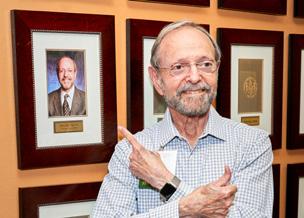
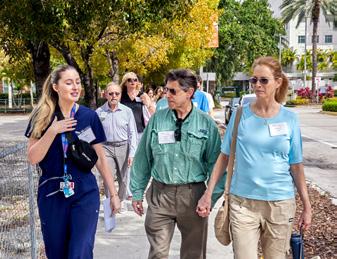
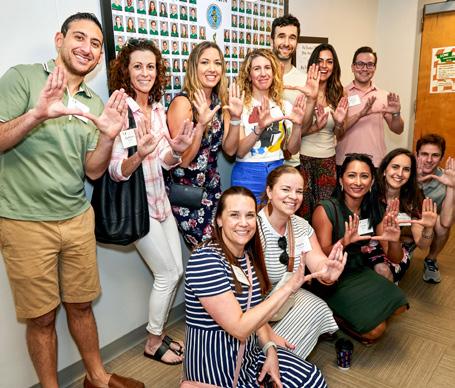
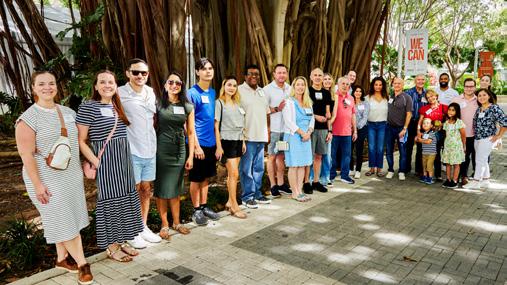
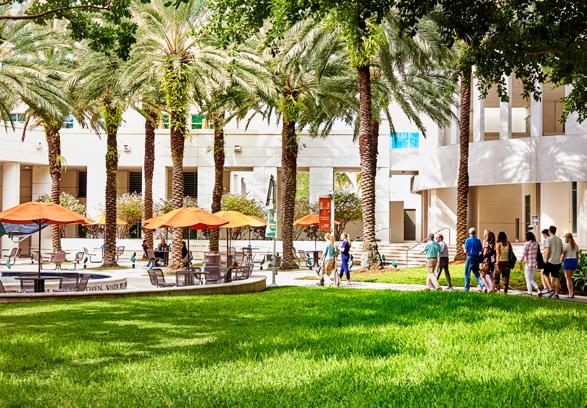
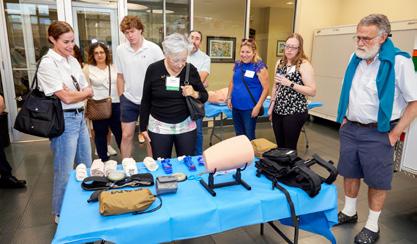
In the past fiscal year, the University of Miami conducted $456 million in sponsored research, a 10%+ increase over the prior year, generating solutions that drive progress for our communities and our planet. A few highlights:
BETTER STORM TRACKING. Scientists from the University’s NOAA Cooperative Institute for Marine and Atmospheric Studies helped develop the Hurricane Analysis and Forecast System, enabling communities to better safeguard life and property.
IMPROVED CHILD HEALTH OUTCOMES.
The School of Nursing and Health Studies received $23.57 million—the largest research grant in Coral Gables campus history—to explore how parents’ stress, fueled by social and economic inequities, can affect their children.
SMARTER CITIES. The University has partnered with the government of Guyana to build Silica City, a smart city designed at the School of Architecture to be a model of sustainability, resilience, and advances in health care.
SAFER FIREFIGHTING. Two University of Miami doctoral students devised a sensor that alerts firefighters when carcinogenic chemicals are present, particularly in peripheral areas of a fire scene where protective gear is not typically used.